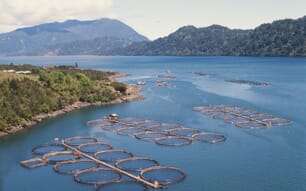"Fish to 2030: Prospects for Fisheries and Aquaculture" expects catches from wild capture fisheries to level off and demand to increase from an emerging global middle class, especially in China.
China is projected to account for 38 per cent of global consumption of food fish by 2030. China and many other nations are increasing their investments in aquaculture to help meet this growing demand.
Asia — including South Asia, South-East Asia, China and Japan — is projected to make up 70 per cent of global fish consumption by 2030. Sub-Saharan Africa, on the other hand, is expected to see a per capita fish consumption decline by one per cent per year from 2010 to 2030 but, due to rapid population growth of 2.3 per cent in the same period, the region's total fish consumption will grow by 30 per cent overall.
In disease news, an outbreak of Infectious Salmon Anaemia (ISA) has been confirmed in Lofoten, Nordland, Norway. The outbreak caused the death of more than 3,000 Atlantic salmon at the Sjøprodukter AS owned farm.
There has also been reports of a possible ISA outbreak at a Marine Harvest farm in Dønna municipality, Nordland. The suspicion is based on test results from the Norwegian veterinary department.
Pioneering scientific work involving a Scottish aquaculture company has made a significant breakthrough that is set to revolutionise efforts to develop robust, disease resistant, farmed salmon.
The milestone achievement will dramatically increase the accuracy of identifying Atlantic salmon for selective breeding, creating a natural shortcut in producing future generations more resistant to disease.
Salmon egg producers worldwide will now have access to a scientific tool to customise breeding programmes and develop healthier and robust strains of salmon in a naturally sustainable way while reducing the use of therapeutic chemicals.
The UK Farm Animal Welfare Committee has published its opinion on the welfare of farmed fish. The opinion considers fish during their time on the farm, while a subsequent publication will cover transport and killing.



